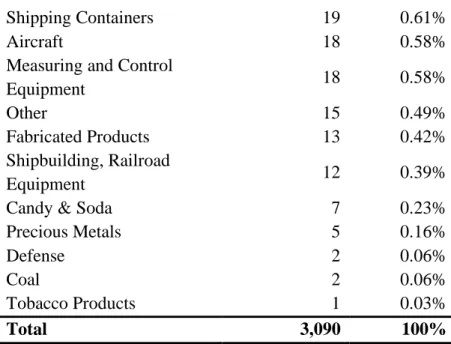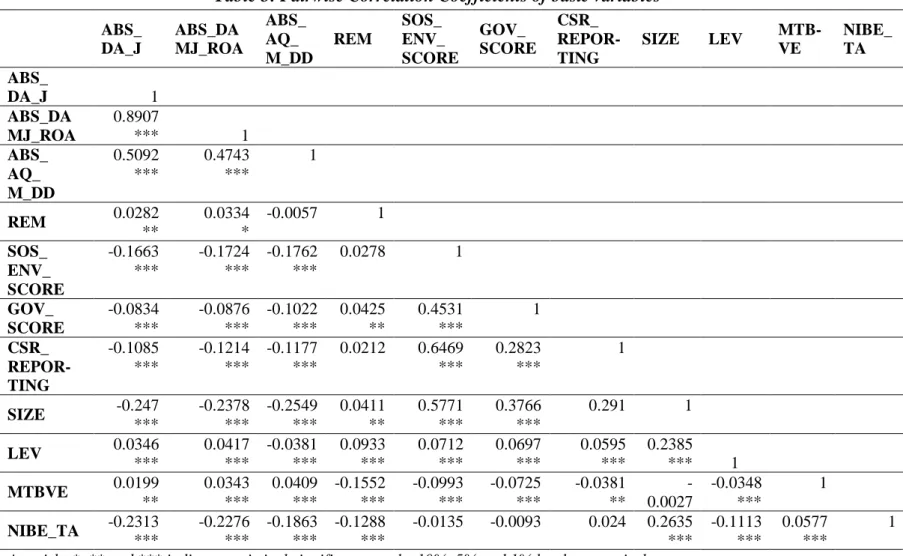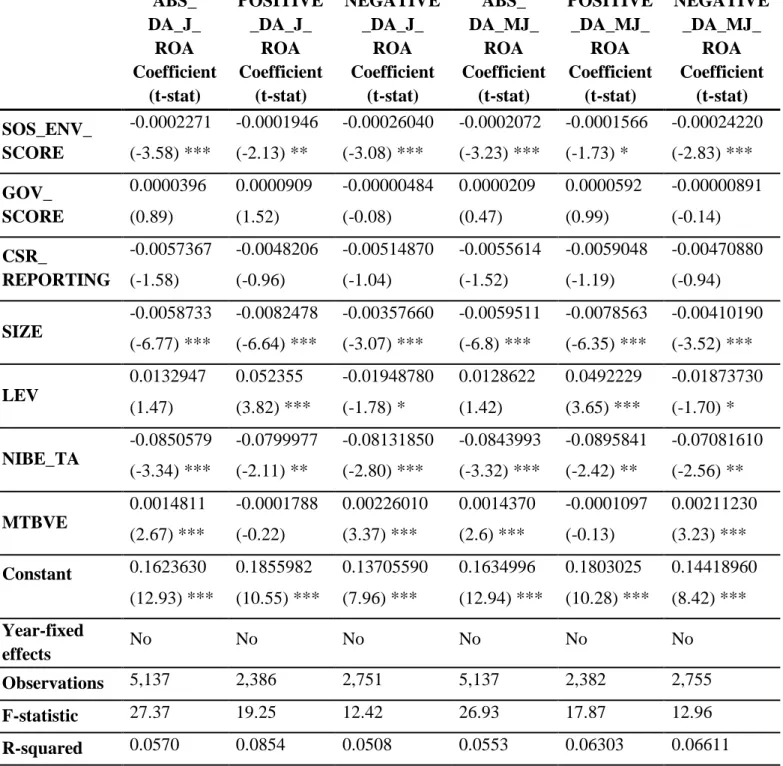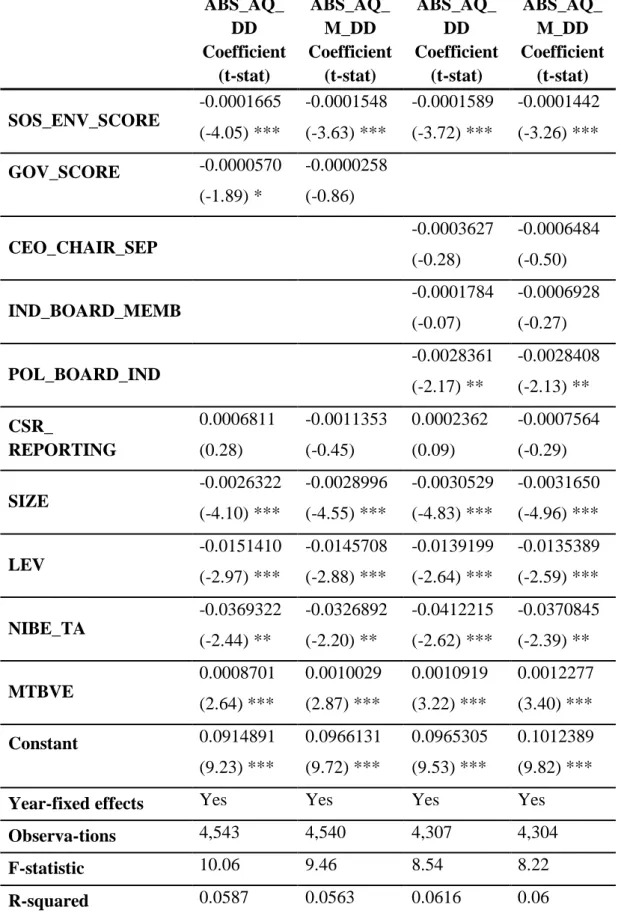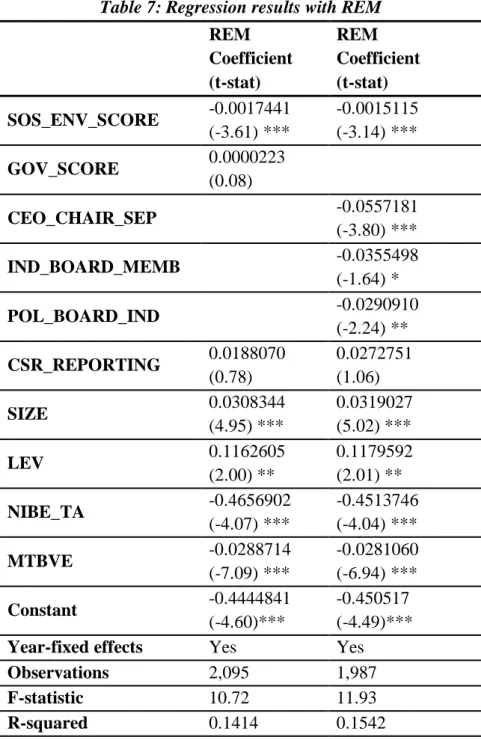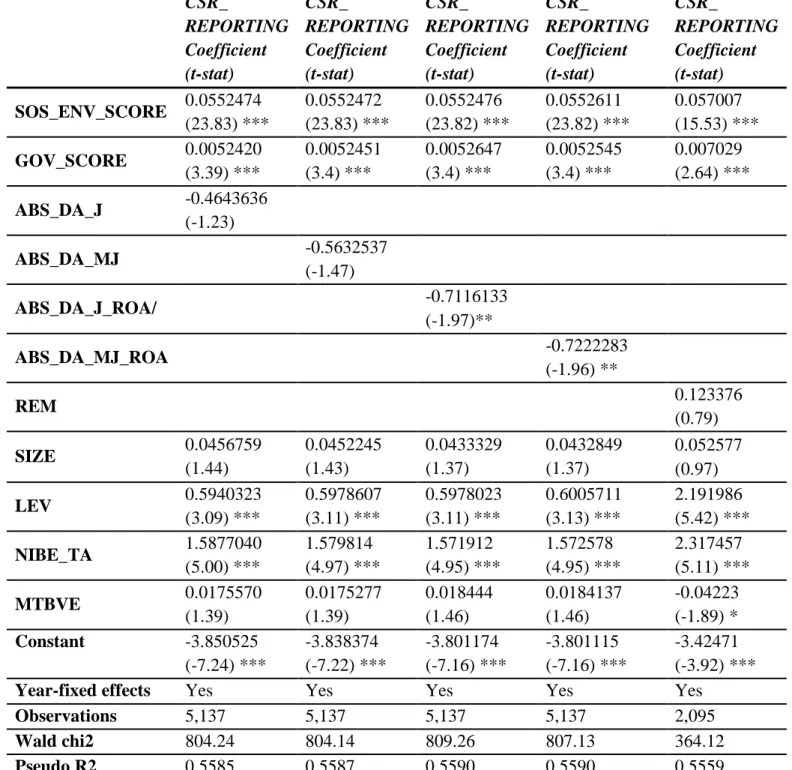The aim of our thesis is to examine the impact of Corporate Sustainability Performance on the earnings management of listed Eurozone firms. For the measurement of Corporate Sustainability Performance, we consider the social and environmental dimension of the firm and define it based on the relative literature (Hummel & Ising, 2015; Lys et al., 2015; Manning et al., 2019). Keywords: Corporate Sustainability Performance, Corporate Social Responsibility, financial reporting quality, accrual-based earnings management, earnings quality, accruals quality, real earnings management.
Introduction
Considering the conflicting theories and the increasing interest of companies to implement high social and environmental impact in their business practices (Eccles et al., 2014; Ioannou & Serafeim, 2015) motivates us to examine the effectiveness of corporate sustainable development (CSP)- link for earnings management for the euro area. We specifically select listed companies from the euro area capital market to examine the CSP-earnings management link for two reasons. Additional measures related to sustainability performance and earnings management are included in our models for completeness (Kim et al., 2012; Lev et al., 2010).
Related Literature, motivation and hypothesis development
Earnings Management
- Definition
- Relationship between Earnings Management with Earnings Quality
- Incentives for Earnings Management
- Measurement of Accrual-Based Earnings Management
- Measurement of Real Earnings Management
However, assuming other factors are constant, there is a close relationship between earnings management and earnings quality. When managers practice earnings management to increase the informativeness of the firm's value, they improve earnings quality. 2003) find evidence that deferred tax expense contributes to the accrual metrics used to detect earnings management aimed at avoiding a decline in earnings or a loss.
We present below six models that are widely researched and used in the accrual-based earnings management literature. DeAngelo (1986) suggests that change in total accruals is expected to be of zero value in the absence of earnings management.
Corporate Sustainability Performance
- Definition
- The impact of Corporate Sustainability Performance on firm performance
- The relation between Corporate Sustainability Performance and Earnings
Regarding the last explanatory variable, they employ cost-sticking behavior (Anderson et al., 2003). Regarding corporate sustainability, there is no consensus on the definition (Cancela et al., 2020; Hummel & Ising, 2015). As such, the adoption of CSR practices implies management transparency and accountability to interested parties (Bozzolan et al., 2015).
It should be clarified that corporate governance is a separate construct from CSR and thus from corporate social responsibility (Kim et al., 2012), and its impact on financial reporting has been extensively studied (Bergstresser & Philippon, 2006; Klein, 2002). ). Corporate governance is a set of mechanisms that influence managers' decisions when ownership and control of the firm are separated (Larcker et al., 2007). If CSR practices are adopted for the private benefit of managers, then corporate governance acts as a disciplinary measure, implying that CSR and corporate governance are negatively related (Kim et al., 2012; Larcker et al., 2007).
In addition, corporate governance is assumed to significantly affect long-term firm performance (Evans et al., 2006) as well as financial disclosure (Cheng & Courtenay, 2006). The relationship between CSP and financial performance has been widely investigated in recent years (Griffin & Mahon, 1997; Xu et al., 2019). There is also evidence that greater CSR involvement improves the quality of financial reporting to mitigate earnings write-offs as well as loss and mortality avoidance (Chih et al., 2008).
There is also evidence from international sample of firms that CSR performance is negatively linked to AEM (Martínez-Ferrero et al., 2015 a; Martínez-Ferrero et al., 2015 b).
Hypothesis development
2020) shows that South African public firms that usually adopt CSR practices are more pronounced in earnings management behavior, in line with Jordaan et al. 2020) find that Egyptian firms with poorer performance use CSR to "green" their earnings. Regarding stewardship theory (Davis et al., 1997), it suggests that managers are responsible stewards of the assets they administer. Thus, their management practices are ethical, social responsibility driven and oriented towards promoting CSR (Davis et al., 1997).
According to the theory, managers engage in CSR in an opportunistic manner, for their private benefit (Dhaliwal et al., 2011). Agency theory suggests that fraudulent firms mislead their shareholders about the actual financial performance, leading to agency problems among them (Labelle et al., 2010). Earnings management behavior also induces or weakens agency costs and harms shareholders (Davidson et al., 2004).
If they are more active in CSR issues to cover up their misconduct, they lose their credibility in financial markets (Prior et al., 2008). To mask their earnings distortion, firms engage in CSP activities (Hemingway & Maclagan, 2004), so they mislead stakeholders about their transparency (Davis et al., 1997). This fertilization behavior is more pronounced when a company serves multiple goals ( Chih et al. , 2008 ; Gargouri et al. , 2010 ), resulting from the responsibility of meeting many and heterogeneous needs of stakeholders.
Furthermore, additional costs caused by sustainability performance practices are assumed to induce managers to distort their earnings (Gargouri et al., 2010).
Sample Selection and Research Methodology
- Sample Selection
- Measurement of Earnings Management
- Detection of Accrual-Based Earnings Management
- Measurement of Accounting Quality via the estimation of the quality of
- Detection of Real Earnings Management
- Measurement of Corporate Sustainability Performance
- Control Variables
- Research Models
In this way, we can better specify the model and relax the constraints of data requirements (Kim et al., 2012). Herein, the residuals from equation (13), called DA_MJ, represent the proxy for earnings management under Modified Jones (Dechow et al., 1995). The residuals from equation (15) named DA_J_ROA represent the proxy for earnings management under the Jones Model (1991) adjusted for performance by Kothari et al.
The residuals from equation (17), called DA_MJ_ROA, represent a proxy for earnings management according to the modified Jones (1991) model, adapted for performance by Kothari et al. Their power is questionable when applied to an economically plausible sample of firms (Dechow et al., 1995). Evidence shows that highly leveraged firms are positively related to earnings management (Anagnostopoulou & Tsekrekos, 2015; Buertey et al., 2020).
In addition, growing firms are more supportive of profit management practices, as it is more important for them to achieve specific profit targets (Chih et al., 2008). There is evidence of a relationship between discretionary accrual and performance (Dechow et al., 1995; Hummel & Ising, 2015). Following on from previous studies (Cohen et al., 2008; Gras-Gil et al., 2016), we use the absolute values of discretionary build proxies that detect the existence of AEM.
Finally, following Choi et al. 2013), we examine how proxies for earnings management and CSP affect CSR_REPORTING.
Empirical Findings
Descriptive Statistics
To examine the relationship between CSP and REM, we estimate the following equations using OLS with year fixed effects and White's heteroskedasticity robust standard errors for the panel data:. Thus, proxies for earnings manipulations are the independent variable and CSR_REPORTING the dependent variable. The results show that the proxy for CSP (SOS_ENV_SCORE), has mean and median value of 56.24 and 58.71 respectively in an interval between 0 and 100 as determined by ESG Refinitiv, with our sample firms presenting a better CSP than previous studies (Hummel & Ising , 2015; Prior et al., 2008) perhaps in light of the growing awareness of companies and stakeholders of public companies and investors towards ESG issues in recent years (Rezaee, 2016) as well as due to different metrics used to interpret the CSP.
We also provide evidence that our sample firms exercise both upward and downward accrual-based earnings management, with the latter being more pronounced and intensive. Furthermore, we note that our accrual estimation errors as well as our REM proxy have a lower mean than the mean of discretionary accruals of our sample of firms, with the REM proxy indicating reduced real earnings management This is in contrast with the relatively larger and positive mean. representative REM value from Kim et al. The growth variable (MTBVE) has a mean of 2.62, lower than that of Kim et al. 2012), justifying that American firms are more growth oriented.
The results illustrate a negative significant correlation between CSP measures and AEM as well as accrual quality measures, but a positive insignificant correlation between CSP and REM measures. We also provide evidence that GOV_SCORE is significantly and highly positively correlated with SOS_ENV_SCORE, justifying our decision to include a control variable for firms. GOV _SCORE is also significantly correlated with earnings management proxies (negative for AEM and accrual accounting, positive for REM).
The control variables firm size (SIZE), leverage level (LEV), firm growth (MTBVE) and firm performance (NIBE_TA) are significantly correlated with all earnings management proxies, indicating that they are significant determinants of earnings manipulation.
Empirical results and interpretation
We also prove the expected negative impact of financial performance on AEM, consistent with previous studies (Chen, 2010; Toukabri et al., 2014). Our control variable for growth, MTBVE, is significant and positive with absolute and positive AEM, supporting that firms are motivated to manage their earnings upward in order to meet the earnings thresholds imposed by the capital market (Bozzolan et al. , 2015; Chih et al. , 2008). Considering the other interpretation of corporate governance through 3 different variables (CEO_CHAIR_SEP, POL_BOARD_IND, IND_BOARD_MEMB), having a policy related to Board Independence signals earnings quality (negative association of POL_BOARD_IND with accrual estimation errors at the level 5% of significance).
This is supported by the fact that independent directors, as less involved in the business, can better monitor business practices from the perspective of transparency and long-term value maximization (Ahmed et al., 2006; Cheng & Courtenay, 2006). Regarding the level of leverage, which has the opposite direction to that estimated in the AEM model, we can conclude that managers of highly leveraged firms are discouraged from misrepresenting their earnings, as creditors carefully and thoroughly scrutinize their finances (Toukabri et al., 2014 ). . In our additional analysis, we run a probit model where CSR Reporting is the dependent dummy variable and CSP is the independent variable, and we use the Differnet proxy for earnings management for each of the 5 regressions.
Regarding the earnings management proxies, we find evidence that accruals-based earnings management is significantly and negatively associated with CSR reporting, for both the ROA Adjusted Jones (1991) and the ROA Adjusted Modified Jones model (Dechow et al., 1995) by Kothari et al. . Summarizing our empirical findings, we find strong evidence that CSP is negatively associated with earnings management regarding Eurozone firms. We define CSP as the average of Environmental Pillar Score (ENSCORE) and Social Pillar Score (SOSCORE) for all regressions (Hummel & Ising, 2015; Lys et al., 2015), as given by the analysts of ESG Refinitiv.
The results of 18 OLS regressions using robust standard error of White's heteroskedasticity are homogeneous given that CSP is negatively related to earnings management at 1% statistical significance.
Conclusion
The Effect of Corporate Social Responsibility Practices on Real Earnings Management: Evidence from a European ESG Data.
